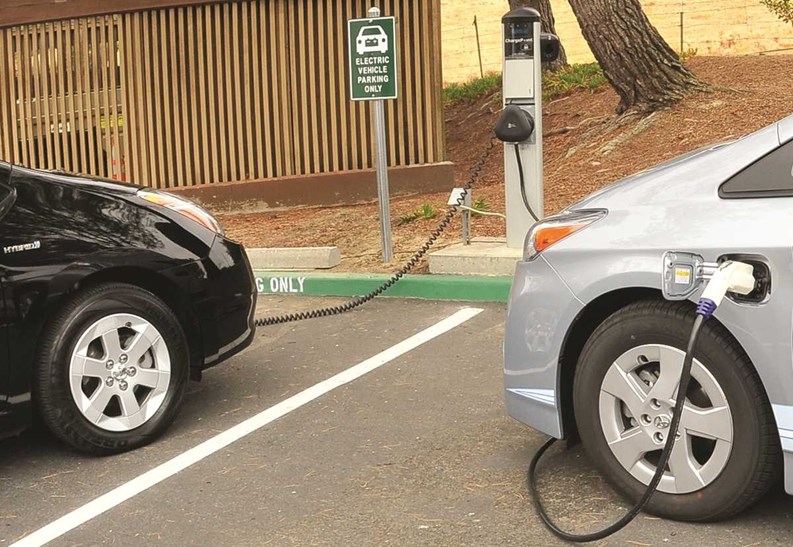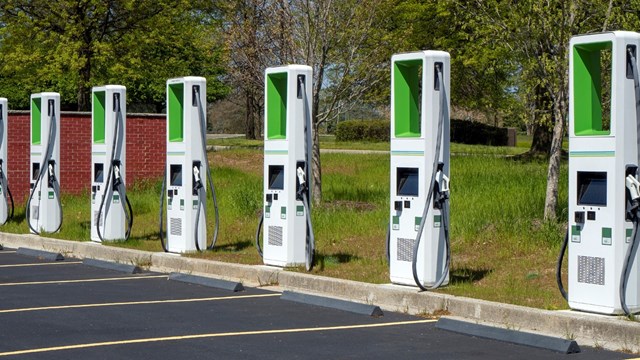Whether condo associations will buy into the so-called “electric highway” has become the perennial $64,000 question.
And the answer? The electric vehicle or EV revolution is coming, albeit slowly.
ChargePoint, Inc., the largest online charging network in the world that connects drivers to charging stations in more than 14 countries, launched New Jersey's first ChargePoint networked charging station for EVs in Vorhees in May of 2010. Three years later, the market for EVs has increased greatly. According to Anne Smith, director of public relations and communications for ChargePoint, there are 1,825 registered EVs in New Jersey. There are now 74 public charging stations to service these vehicles, a seemingly disproportionate amount when compared with states such as Massachusetts, which has 208 public charging stations for its 1,432 registered EVs.
“More and more drivers are turning to electric cars for cleaner transportation, reduced fueling costs and decreased dependence on foreign oil,” Smith says. “However,” she continues, “convenient places to charge are necessary for the adoption of electric vehicles. Most experts agree that a large part of charging will be done at home. Very simply, installing charging stations will attract quality tenants. Which is to say, property managers have a way to differentiate their property by offering a coveted amenity to conscientious tenants. There has been a huge surge of EV buying since the beginning of 2013 and there are now more than 100,000 EVs on the road in the U.S.”
At some point, condominium owners and developers may decide to install charging stations, but right now, it’s difficult to find many condominiums with charging stations here. For condos, however, being “smart” may soon become a calling card.
One luxury condo that does feature EV charging stations for residents is the Monaco in Jersey City. The development consists of two 50-story towers, with 524 residential units, 12,000 square feet of ground-level retail space and a 10-story parking deck. Several other towns like Montclair and New Brunswick, and various retail malls, restaurants, gas station rest areas and shopping centers throughout the Garden State, have installed public charging stations.
One of the factors with EVs is that heat and air conditioning draw from the vehicle’s battery, resulting in a more frequent need to charge. But, “buyers will simply use the car when it’s appropriate,” says Carly Kade, communications manager for eVgo Communications of Houston, Texas. She says consumers buy a car appropriate for travel on average days, regardless of where they live. According to eVgo, dedicated chargers for multi-family buildings are one of four primary needs for EV drivers (the others being range confidence (mileage per charge); standardized, transparent costs; and low upfront cost).
Initiatives and Incentives
The push toward EV is driven by the ultimate desire to make New Jersey a safer, less pollution-filled environment to live in. EVs lower urban heat, reduce vehicle noise (and urban noise overall), and lower car carbon emissions and oil dependence.
“The immediate and long-term benefits of switching to EVs are the same in New Jersey as they are elsewhere—you’re getting better gas mileage and improving the environment,” Bob Considine, the press officer and spokesman for the New Jersey Department of Environmental Protection (NJ DEP). “To a degree,” he continues, “it’s probably even more tangible gains for EVs and alternative fuel vehicles here than in other stages when you account for our high concentration of people and automobiles. We have a lot of folks driving in a very populated state. You get traffic and you get idling. So drivers of EVs here can probably be doing a better service for themselves and their state.”
Unless residents want to look at electric cords hanging over patio walls, charging stations may become imperative as usage grows. Fortunately, the federal government is offering incentives to assist with installation, and soon, to assist with upkeep and maintenance.
According to the U.S. Department of Energy’s Alternative Fuels Data Center, New Jersey offers multiple incentives for EV drivers. The New Jersey Turnpike Authority allows qualified hybrid electric vehicles to travel in the High Occupancy Vehicle (HOV) lanes located between Interchange 11 and Interchange 14 on the New Jersey Turnpike. The New Jersey Turnpike Authority offers a 10 percent discount on off-peak New Jersey Turnpike and Garden State Parkway toll rates through NJ EZ-Pass for drivers of vehicles that have a fuel economy of 45 miles per gallon or higher and meet the California Super Ultra Low Emission Vehicle standard. The Zero Emissions Vehicle (ZEV) Tax Exemption ensures sold, rented, or leased in New Jersey ZEVs are exempt from state sales and use tax. This exemption is not applicable to partial zero emission vehicles, including hybrid electric vehicles. Lastly, the Reduced Propane Fuel Tax ensures the tax imposed on liquefied petroleum gas, or propane, used to operate a motor vehicle is equal to half the tax paid on the sale or use of gasoline.
According to the National Conference of State Legislatures there are several more incentives proposed in Trenton by the state Legislature, awaiting action, including Senate bill S980, which encourages development of electric vehicle charging stations in transportation projects; S2193 which provides sales and use tax exemptions for electric vehicle charging equipment; A3419, which requires the New Jersey Turnpike Authority to provide compressed natural gas refueling and electric vehicle recharging stations at certain rest areas; and A3637 and A3638, which provide for a grants program encouraging compressed natural gas and electric vehicle conversion training programs.
Plugging In
According to eVgo, dedicated chargers for multi-family buildings are one of four primary needs for EV drivers (the others being mileage per charge, standardized, transparent costs and low upfront cost). One wonders how board members will handle the cost of electric charging stations for residents and just who will pay the cost for the electricity they consume. At some point, condominium owners and developers may decide to install charging stations. Suzanne Tamargo, a spokeswoman for the nationwide service Car Charging—the provider for Walgreen’s stations (the chain has installed public stations at many of its urban locations)—says that, while condominium associations may or may not charge, most public facilities have some kind of fee, even if it’s only for using the parking space allotted to a charging station. Some places charge by time, others by unit of energy
Boards will have to consider the cost if they do install chargers, and determine how non-electric car users fit in. The cost of supplying electricity varies, but typically runs about 50 cents to 75 cents an hour, according to Pike Research/Energy Market Intelligence.
For example, in California, condo boards initially balked at installing EV stations until the law prodded them. The Luskin Center for Innovative Research at UCLA reports that boards disliked the cost of installing charging stations, which may vary from a low of $3,000 up to $15,000—especially when Level 1 is essentially the equivalent of running an extension cord from the dwelling.
“Licensed installers for charging station installation can be recommended by the charging station seller, however many apartments/condos have their own electricians,” Smith says. “Typically EV charging stations are installed in the garage or a parking lot. Maintenance for both software and hardware is included with the purchase of ChargePoint stations. The platform provides everything a station owner needs to offer charging services, including 24x7 station-side driver support, maintenance and billing. Plus, an owner can set up EV charging service exactly as you like, to track consumption by tenant, manage costs, etc.”
Whose Place is It?
According to eVgo’s Kade, there are some challenges when it comes to situating charging stations in associations. For instance, for condominiums, the problem stems from parking spaces being deeded to individual owners. “We choose to deploy chargers in groups to keep the cost of the infrastructure as low as possible,” she says. “Therefore, we need to designate parking spaces that are not deeded, or where the HOA is willing to relocate existing parking assignments. We have had success in condominiums where they were willing to provide non-deeded space.”
J.R. DeShazo, director of the Luskin Center for Innovation at UCLA, says boards can take the simplest approach first. “Using what they already have is the smartest thing, and the cheapest thing, they can do. If there are 110-volt outlets, just utilize them. People can do that with a wall plug, and 95 percent of the vehicles will fully recharge overnight. Ten hours will give you 100 miles, so if you’re driving less than 60 miles a day, that’ll be fine.”
For example, a Level 1 charging station is just like a regular outlet. A Level 2 station is a fancy 240-volt outlet—like an electric dryer hookup. Installing electric vehicle chargers in most cases doesn’t even require a special permit beyond what one would need to install these outlets.
But, at Level 2, costs can become more “challenging.” DeShazo dubs this the battleground for condo boards, saying, “You might have to run wiring in an existing building.” He prefers that new installations or retrofitting an existing building offer conduits for electric charging, in case it is ever needed. Additionally, local building codes may need to be changed.
DeShazo also suggests condo boards can reassign parking spots so that electric vehicles will be close enough to use existing Level 1 plug-ins. “If that doesn’t work, then the ideal is to consider the building type, codes, etc., to see if it will allow residents to install their own charging space, and if possible pay the electric bill. It’s ideal to connect to an existing meter, but they might get two bills instead of one.”
Why should condo boards consider this? DeShazo says it’s mainly to be progressive and environmentally-friendly.
“We (in California) have about 45,000 EVs on our roads. So some buildings are marketing themselves as EV-friendly or EV-ready, meaning they have a unit with at least a 110-volt outlet. Condos tend to be really conservative. It’s hard to get them to do it … but being EV-friendly becomes simply another amenity they need to provide. Many make the investment and then figure out cost recovery.”
Ann Frantz is a freelance writer and a frequent contributor to The New Jersey Cooperator. Editorial Assistant Enjolie Esteve contributed to this article.







Leave a Comment